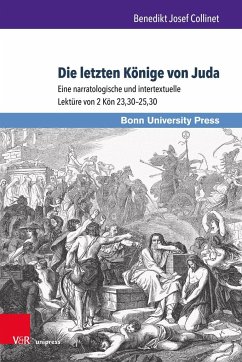Die letzten Könige von Juda führen das Gottesvolk direkt ins Exil und in die Katastrophe der Zerstörung des Ersten Tempels. Wie dies geschieht, wer die Verantwortung trägt und welche Rolle Gott in diesem Drama spielt, sind die Fragen, denen Benedikt Collinet nachspürt. Die Könige sind nicht, wie die Erzählweise nahelegt, Hauptdarsteller des Dramas, sondern Antagonisten zu Gott. Dieser verwendet die Nachbarvölker und Babel als Strafwerkzeuge. Der Grund für die Strafen ist der systemisch gewordene Bundesbruch des Gottesvolkes. Die Bemessung der Strafen ist vertraglich geregelt (Dtn 28). Die Geschichte ist eine durchkomponierte Dekonstruktion der göttlichen Heilszusagen. Die Heilsgaben werden zurückgenommen, die Verheißungen aber bleiben intakt. Das Volk braucht einen Neuanfang, der in Anspielung auf den Exodus, einzig in der Begnadigung Jojachins angedeutet bzw. vorbereitet wird (2 Kön 25,27-30).
The last kings of Juda led God's people directly into exile and thus in the catastrophe of the destruction of the first temple. How did that happen? Who was responsible? What kind of role did God play in this drama? These questions will be addressed by Benedikt Collinet. Unlike the narrative suggests, the kings were not the protagonists of the drama but the antagonists to God instead. God used the neighbouring peoples and Babel as tools of punishment. The reason for these punishments was the systemic covenant break of God's people. The consequences of these punishments can be read in Deuteronomy 28. The story is a composed deconstruction of divine salvation promises. The salvation gifts were withdrawn but the promises still remained. The people needed a new beginning that with reference to the exodus could only be indicated or prepared by pardoning Jehoiachin (2 Kings 25:27-30).
Hinweis: Dieser Artikel kann nur an eine deutsche Lieferadresse ausgeliefert werden.
The last kings of Juda led God's people directly into exile and thus in the catastrophe of the destruction of the first temple. How did that happen? Who was responsible? What kind of role did God play in this drama? These questions will be addressed by Benedikt Collinet. Unlike the narrative suggests, the kings were not the protagonists of the drama but the antagonists to God instead. God used the neighbouring peoples and Babel as tools of punishment. The reason for these punishments was the systemic covenant break of God's people. The consequences of these punishments can be read in Deuteronomy 28. The story is a composed deconstruction of divine salvation promises. The salvation gifts were withdrawn but the promises still remained. The people needed a new beginning that with reference to the exodus could only be indicated or prepared by pardoning Jehoiachin (2 Kings 25:27-30).
Hinweis: Dieser Artikel kann nur an eine deutsche Lieferadresse ausgeliefert werden.








